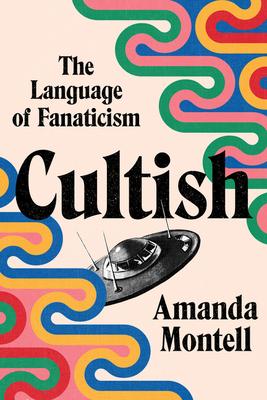I haven’t been very good about posting for Nonfiction November, but this week is one of my favorite topics. Hosted by Rebekkah at She Seeks Nonfiction, the question is: What nonfiction book or books have impacted the way you see the world in a powerful way? Is there one book that made you rethink everything? Is there a book that, if everyone read it, you think the world would be a better place?
I wanted to write about books about racial justice (in my opinion everyone should read Just Mercy and Caste), but since I’ve written about those books before, I want to write about a book I read very recently and that I’m still thinking about.

Cultish, by Amanda Montell, was recommended by Silver Button Books in last year’s Nonfiction November. This is a book about psychology and language, two of my favorite topics. Montell writes about the strategies employed by cult leaders like Jim Jones, Scientology, and Heaven’s Gate. She explores what draws people into these groups, and what types of people are most susceptible. These charismatic cult leaders use language to create a sense of community. An example of a common strategy is using made up words for common terms. This makes members feel they are part of an elite group that the outside world can’t understand. Cults also use language to discourage critical thought and shut down arguments (similar to what you might see in a controlling relationship).
She then explores how these same strategies are employed in marketing, particularly by multilevel marketing businesses like Amway and Lularoe, and by hardcore fitness programs like SoulCycle. She isn’t arguing that these businesses are cults; rather, that they play on certain people’s susceptibilities and can pose a huge threat financially.
Written in 2021, this book has increasing relevance today. Montell finishes the book with an analysis of how social media and the internet has amped up the effects of cultish language, notably through QAnon. She describes the huge reach, the shapeshifting nature, and the very dangerous consequences.
I was fascinated by Montell’s analysis, partly because these types of marketing are everywhere and we all know people who are influenced by them. Montell has very good suggestions for things people should look for and ask about. It isn’t about blame as we can all be drawn into these groups, and they aren’t all inherently dangerous if we’re careful. For example, some of the fitness groups can be dangerous because they push people too hard in ways that aren’t physically safe. That doesn’t make them a cult or a scam, but something people need to question if something makes them uncomfortable.
I was very interested in her description of who is most susceptible to these groups. It isn’t about whether you’re educated or not. Rather, it’s about whether you’re looking for groups that make you feel like part of a “family”. The MLMs and fitness programs appeal to a person’s whole identity, rather than someone who just wants to make a little money or increase their fitness. It’s about whether you’re someone who goes “all in” on something. A person who is drawn to an MLM or one of these fitness programs is someone who will commit to something 100% and feels they can succeed if they put in more effort.
A person who wants to believe in a larger goal or dream will be a good fit for these groups, where a person who’s more skeptical may not be. Montell describes herself as “not cultish” but that’s partly because her father was in a cult and she’s been raised to be wary of them.
I realized I’m also “not cultish” because I’ve never been an “all in” kind of person. If I volunteer, it’s 1 or 2 hours a week. I care a lot about balancing my time, which means I don’t take jobs that require all-nighters or join groups that require too much of my energy. I’ve always seen this as a weakness; there’s something in me that fails to fully commit to things, except for marriage, work and maybe this blog. I’ve always felt I hold back too much, which keeps me from fully experiencing things. But maybe that internal caution/balance is also a good thing.
Montell also reminded me that no one is immune to this kind of marketing. She uses the example of time-share sales, something I have experienced. When Mr. CG and I were on our honeymoon in Hawaii, we went to a time-share presentation so we could get a free helicopter tour. We went in for the freebie, but several hours later left the dazed owners of a time share. A few days later, September 11 happened, and the company was willing to void our contract. But I’ve often thought about our vulnerability in that moment. We were hoping to put a down-payment on a condo, not buy a vacation home.
Because Montell’s analysis has such wide application, I think most people would benefit from reading this book.
What nonfiction do you consider to be “mind openers” or books everyone should read?

